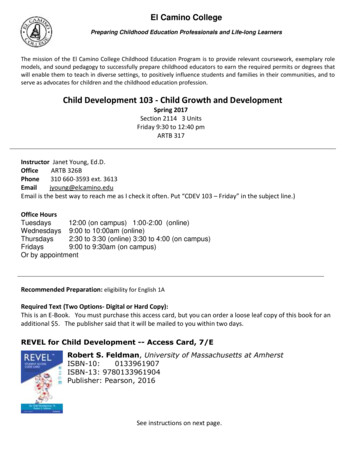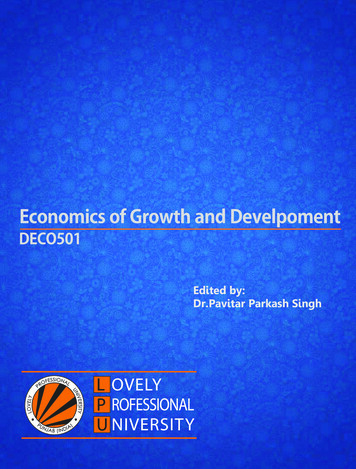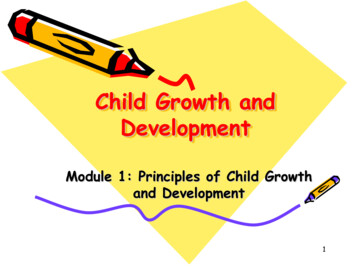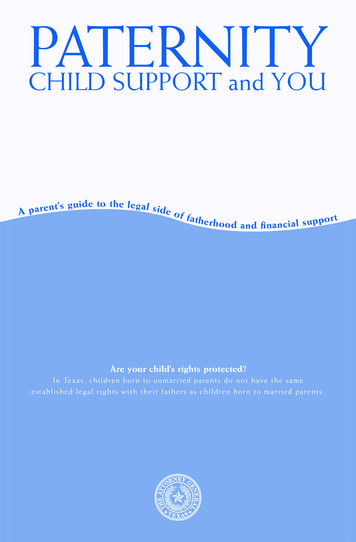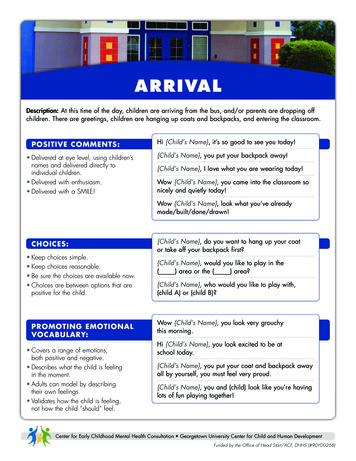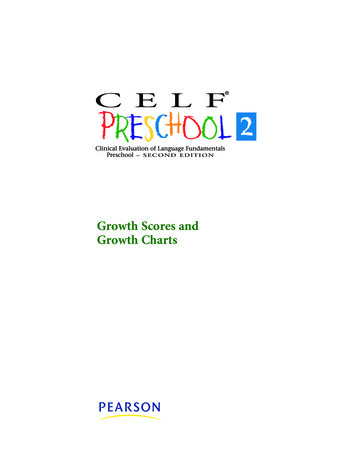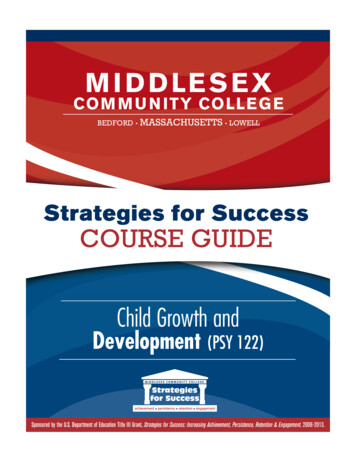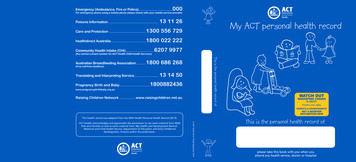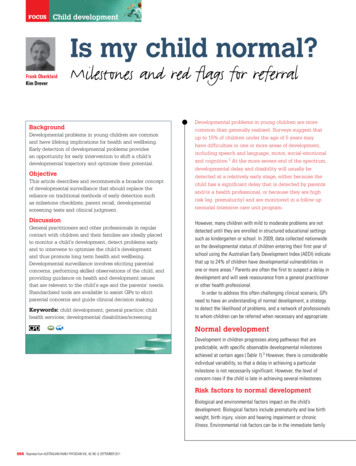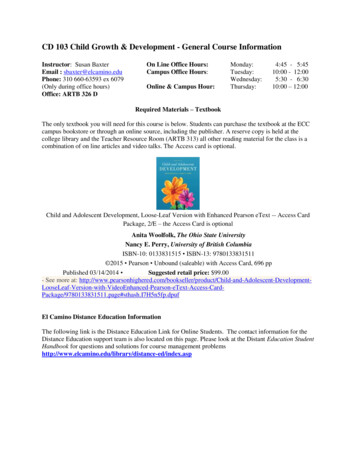
Transcription
CD 103 Child Growth & Development - General Course InformationInstructor: Susan BaxterEmail : sbaxter@elcamino.eduPhone: 310 660-63593 ex 6079(Only during office hours)Office: ARTB 326 DOn Line Office Hours:Campus Office Hours:Online & Campus Hour:Monday:Tuesday:Wednesday:Thursday:4:45 - 5:4510:00 - 12:005:30 - 6:3010:00 – 12:00Required Materials – TextbookThe only textbook you will need for this course is below. Students can purchase the textbook at the ECCcampus bookstore or through an online source, including the publisher. A reserve copy is held at thecollege library and the Teacher Resource Room (ARTB 313) all other reading material for the class is acombination of on line articles and video talks. The Access card is optional.Child and Adolescent Development, Loose-Leaf Version with Enhanced Pearson eText -- Access CardPackage, 2/E – the Access Card is optionalAnita Woolfolk, The Ohio State UniversityNancy E. Perry, University of British ColumbiaISBN-10: 0133831515 ISBN-13: 9780133831511 2015 Pearson Unbound (saleable) with Access Card, 696 ppPublished 03/14/2014 Suggested retail price: 99.00- See more at: e/9780133831511.page#sthash.I7H5n5fp.dpufEl Camino Distance Education InformationThe following link is the Distance Education Link for Online Students. The contact information for theDistance Education support team is also located on this page. Please look at the Distant Education StudentHandbook for questions and solutions for course management d/index.asp
This is a direct link to the student’s ed/Spring2013Handbook.pdfClass Orientation & Securing Space In ClassThere is NO on campus orientation.If a student wishes to remain in the class each student needs to complete the following 4 steps by theassigned dates:1.2.3.4.Complete the "Introduction" in the Discussion and Private Message section of the courseComplete the course outline Scavenger Hunt assignmentAuthorize that you have read the class syllabus so that you may have access to the course content.Email the Instructor your alternative contact information through the ETUDES course “privateMessage” feature, not myecc email. Provide either personal email or phone number in case thecourse management system (ETUDES) or ECC system crash.A student may be dropped and another student added in his/her place if the 4 steps are incomplete.Catalog DescriptionThis course is an introduction to child development from conception through adolescence with anemphasis on physical, cognitive and psychosocial growth. The effect of environmental and culturalinfluences on development will be investigated. Developmental theories will be analyzed and testedthrough practical applications such as child observations and interviews.Note: This is a core course for all teachers and assistants in early childhood programs regulated by theState of California.Course Objectives1. Define developmental theory and explain how theories are used to understand child behavior anddevelopment.
2. Examine and discuss major theories of child development such as those of Piaget, Vygotsky, Freud,Erikson, and Bronfenbrenner.3. Evaluate the effectiveness of theories in terms of their practical applications in parenting and teaching.4. Analyze the interdependence of the cognitive, psychosocial and physical domains of development.5. Demonstrate knowledge of the physical, social/emotional, cognitive and language development ofchildren, both typical and atypical, in major developmental stages.6. Demonstrate knowledge of current research findings as they apply to child development.7. Define various methods of observation and utilize these methods to collect data.8. Demonstrate objective techniques and skills when observing, interviewing, describing,9. Analyze and interpret data collected through observations and interviews.10. Examine and evaluate the role of family, teachers, and other professionals in facilitating thedevelopment of children.11. Examine and evaluate the role of play and its relationship to development at various stages.12. Analyze the effect of biological, environmental and cultural influences on development of children ofall ages.Student Learning Outcomes (SLOs)SLO #1 Major Theoretical Frameworks Identify and compare major theoretical frameworks, such asPiaget, Vygotsky, Erikson, and Bronfenbrenner, as related to the study of human development.SLO #2 Milestones Describe major developmental milestones and typical characteristics for childrenfrom conception through adolescence in the areas of physical, psychosocial, cognitive, and languagedevelopment.SLO #3 Research Methodologies Apply developmental theory to child observations, surveys, and/orinterviews using investigative research methodologiesADA Statement:El Camino College is committed to providing educational accommodations for students with disabilitiesupon the timely request by the student to the instructor. A student with a disability, who would like torequest an academic accommodation, is responsible for identifying herself/himself to the instructor and tothe Special Resource Center. To make arrangements for academic accommodations, contact the SpecialResource Center.Please Note: Students with disabilities who believe they may need accommodations in this course areencouraged to contact the Special Resource Center at 310-660-3295 as soon as possible to betterensure such accommodations are implemented in a timely fashion. As well, please contact meprivately to discuss your specific needs. I am constantly working to upgrade my course material so that all students can access theinformation in a variety of modalities in accordance with IDEA. I might have missed somethingor did not realize a part of a module is not in compliance. If any student is having troubleaccessing material or the resources you use to interpret the work, you cannot read parts of aModules or an Assignment Guidelines, please let me know as quickly as possible via Etudesemail. There are always solutions that we can find so that you may fully participate in the onlineclass.
Student Code of t Rights and Grievances Procedure olicies.aspStudy and Preparation Time:College credit is given based on the formula of the Carnegie unit: for every one hour spent in class, youare expected to spend two hours in preparation and study time outside of class. This adds up to 6 hoursper week for a 3-unit course.Academic Calendar Spring Semester – 2015First Day to Apply for Graduation and Certificates (Spring) Monday January 5 2015Spring Semester Classes Begin Saturday January 17 2015Martin Luther King Holiday (Campus Closed) Monday January 19 2015Weekday Classes Begin Tuesday January 20 2015Last Day to Drop and Be Eligible for a Refund (1st 8-Week Session) Friday January 23 2015Last Day to Add (Full Semester Courses) Friday January 30 2015Last Day To Drop and Be Eligible for a Refund (Full Term) Friday January 30 2015Last Day to Challenge Residency Status for Current Semester Friday January 30 2015Last Day to Drop Without Notation on Permanent Record Friday January 30 2015Active Enrollment Census Monday February 2 2015Lincoln’s Day Holiday (Campus Closed) Friday February 6 2015Last Day to Apply for Degrees and Certificates (Spring) Friday February 13 2015Washington’s Day Holiday (Campus Closed) Monday February 16 2015Spring Recess (Faculty & Students) Sat-Fri March 14-20 2015Mid-Term Classes Begin Saturday March 21 2015Last Day to Drop with a “W” Friday April 17 2015Spring Semester Ends Friday May 15 2015Graduation Friday May 15 2015BUILDING A CLASS COMMUNITY & SKILLS FOR SUCCESS!In order to succeed in this course I invite you to:1. Have regular and reliable access to a computer. Computer issues need to be resolvedby the student and are not an excuse for missing assignment submissions.2. Be willing to read, read, and re-read the syllabus and all other posted materials.3. Understand that the 8 Modules are considered the same as it would be to attendlectures on campus. It is expected that all 8 will be completed. Assignments are basedon the content of Modules and the textbook chapter being studied in thecorresponding week and are worth 80 points.4. Read ALL ANNOUNCEMENTS.
5. Be a self-motivated learner and possess good time management skills.6. COMMUNICATE with me and with your classmates. Be willing to ask yourinstructor and classmate’s questions if you don’t understand something. There arechat rooms and email systems with in the class site to do this. I am also accessible byemail sbaxter@elcamino.edu if you are having trouble using the ETUDES programDropping this ClassI am hoping that you all complete this class and have a wonderful, rewarding learning experience.However, if you decide to drop this class, it is your responsibility to notify the College. This must be doneonline through MyECC. If you stop participating, but do not formally withdraw from the class, you willreceive a grade of F. Don’t let this happen. Be sure to drop the class online or in person. A list of the dropdates are provided in the calendar below.The instructor reserves the right to drop students who visit the online course site but does not completeassignments or participate in class discussions.Managing Your TimeOnline classes are open 24/7. Please review the due dates for the assignments/discussions/concept papersso that you can plan your time according. It is important that you keep up with your reading and yourassignments so you don’t fall behind. Most assignment are not accepted after the due date to help spuryou on to keep up with the fast pace of an online program. If I notice you have not started an Assignmentor not visited the class for 7 days I will email you to see how I can support you.**My Commitment to You**To support each student’s opportunity to meet their learning potential.Integrate course objectives into active learning experiences.Become familiar with core concepts of child development.Support student personal and academic goals.Contribute to the opportunity for a positive experience at El Camino Community College.NOTE:You will be notified of all class changes and corrections through Announcements in the Etudes course
S. BaxterCD 103 Child Growth and Development (Online) - Assignment OverviewThis document will provide an overview of each assignment that each student will need to complete tomaintain their grade of A which each student now has at the start of this class. More detailed assignmentguidelines are provided with each assignment.Marking Criterion: clear evidence of process (process is more important than product)active or authentic learning (evidence of organic learning or growth not just retrieval andprocessing of information)instructions were clearly followedauthentic and creative workAuthentic Learning:Authentic Learning can be described as an opportunity for the student to build a relationship to theinformation. Your work is graded for its originality, your personal reflections of ideas, reflections andopinions and ownership of your own learning process. It is important to engage in learning communitiesand build ideas but it is important to keep ownership of your own work and process.When I grade your work I am looking to see that you are the author of your work. I will not give credit torewriting other peoples work, copying pages from books or other students worksheets or submittingassignments that you or a student have prepared for another class. Please be responsible for your ownexperience and manage you time so that you can benefit from the opportunity to expand your connectionto what you are studying.Assignment Submission Guide:1. There is not late work accepted2. All assignments need to be uploaded on or before the due date3. There are very few exceptions for overdue work and need to be arranged with the Instructorbeforehand.4. Any essay or submission in college has a format standard which includes: typed, double-spacedon standard-sized paper (8.5 X 11 inches) with margins of 1 inch on all sides. The font is usuallyNew Roman Times, 12 point. The expectation is that each page holds about 250 words5. Use APA format for Works Cited. Please refer to APA guide located on the tab at the left formore details if you are not familiar with APA formatting6. All documents need to be submitted with doc or docx. I cannot open wps, rft documents.7. Any upload of jpeg, png, gif and so on, needs to be formatted to the correct size (no bigger than700 pixels). Please check photo properties before inserting pictures. There is a resize photo tabto help those who are unsure how to reformate the size of your upload.
ASSIGNMENT APPORTIONMENT AND DUE DATESIndividual Due Dates for Class Discussions and Chapter Reviews are on the Class Schedule.The pace of an Online Class requires all assignments are handed in by the Due Date.AssignmentScavenger HuntClass Introduction(15 pts intro 5 pts attachment)Text Book Chapter ReviewPointsDue Date10 Thursday 1/22 by 11:45 pm25 Saturday 1/24 by 11:45 pm260 Friday by 11:45 pm(13 x 20) See Individual dates for each Chapter Reviewon Class ScheduleClass Discussions125 5 x Sundays by 11:45 pm(5 x 25) See Individual dates for Class Discussions onClass ScheduleAutobiography100 Saturday February 14 by 11:45 pmAttachment Relationships in Babies100 Saturday February 28 by 11:45 pmToying with the Brain100 Saturday April 4 by 11:45 pmA Tribute to My Childhood Friend100 Wednesday May 5 by 11:45 pmAdolescent Socialization & Technology100 Wednesday May 13 by 11:45 pmModule Completion80 Thursday May 14(10 x 8)Total Points1000A 1000 – 900 B 899 to 800 C 799 to 700 D 699 to 600 F 599 to 0Scavenger Hunt (Go to “Assignments, Tests, and Surveys” for full instructions)This is the first assignment that needs to be completed to stay enrolled in the class. Students who do notcomplete this assignment will be dropped for the roster. It requires that students click on the Hunt andanswer the questions that can be found in the course syllabus and schedule. Upon submission the studentwill receive his or her assignment results.Class Introductions: (go to Discussions and Private Messages tab). This is a 1 time assignment whenstudents have the opportunity to introduce themselves to their fellow students. The assignment also getsnew online students to get use to online patterns, attach a document, and create and avatar. An Avatar is apicture that represents you in all your communications with the online community. You should havereceived and information sheet about how to create an avatar and how to post your introduction and addan attachment. For full marks you will need to post your introduction and 2 responses to fellow studentsand attach a picture that is less than 700 pixels.Class Discussion & Module Projects (go to Discussions and Private Messages)This course has 5 Class Discussions which are located under the Class Discussion Forum. Each classdiscussion is built around each part of the textbook and modules. The discussion will address a topicrelative to each stage of development. Student’s post and response are due before the correspondingSunday @ 11:45 p.m. Students who post before Friday will receive full grade for the Discussion
contribution and should be posted after you have carefully read the corresponding module. Students whoadopt this practice will benefit from the discussion and full credit. There is an Illustrated Classintroduction & Class Discussion Users Guide I have created to help out. It was attached with yourwelcome Letter and is available as an attachment in both Introduction and Discussion assignmentportal.There is often an activity or article that has been completed in the corresponding module that will need tobe included in the discussion post.To participate in each of the 5 Class Discussions each student needs to go into the link which takes youinto the discussion for the week (i.e., Discussion #2). The weekly schedule will have submission dates foreach week if there is any confusion about the time line for each discussion.Each Student is required to participate in the each Class Discussion a minimum of 3 times: 1 Posting and2 Responses. Please feel free to exceed this minimum. A Posting means the students is addressing thediscussion topic with his or her opinion and thoughts about the given topic or prompt. A response isadding thoughts and insight into another students posting.Class Discussion Grading Highlights – there is a formal grading rubric attached to the InstructionGuideline for Class Introductions and Class DiscussionsFull Points – Post is relevant to the topic Post CLEARLY incorporates information from course readings and modules – opiniondemonstrates student has read course material. First post contribution is completed before Friday of discussion week Minimum of 2 responses to fellow students Response are relevant to the student’s post, not generalized Spelling and grammar of posts and responses are at College Level Attachments are correct pixel size when required (see side bar menu in course if you do not knowwho to manage the size of your pixels)Deductions – 3 points if first post is not before Friday 3 points if only 1 response 5 points if no response 3 points if attachment is not the correct size 5 points if no attachment when required 3 to 5 points for spelling and grammar errorsTextbook Chapter Reviews (Go to “Assignments, Tests, and Surveys” for full instructions)There are 13 Chapters. Each chapter is reviewed through a set of 10 multiple choice questions worth 2points each. The Chapter Review is not timed and students are welcome to use their textbook for theanswers.Autobiography (Go to “Assignments, Tests, and Surveys” for full instructions)
Each student will write an account of their childhood from birth to adolescence using theorist ErickErickson’s Psychosocial Stages of Development found in Chapter 2 of the Course textbook.Attachment Relationships In Babies (Go to “Assignments, Tests, and Surveys” for full instructions)This assignment is based on Bowlby’s theory of attachment and uses the movie “Babies” to discuss howculture impacts Attachment and why secure attachment is so important to the healthy development of thechild.Toying With the Brain (Go to “Assignments, Tests, and Surveys” for full instructions)This assignment requires the student to use the information accumulated during the study of the preschoolchild in the textbook and Modules and calls for the student to define Key Terms. After defining key termsthe student will analyze 3 different toys in relationship to how they support a child’s development. Thestudent will incorporate Piaget and Vygotsky’s theories.Best Friend Tribute (Go to Discussion and Private Message for full instructions)Each student will create a Prezi presentation (interactive power point) that is a tribute to their best friendfrom grade school during the middle childhood years. The presentation will be posted so that studentsmay read and respond to each other’s tributes. Instructions on how to secure a free Prezi account andtutorial to use Prezi for students new to the process is included.Adolescent Socialization & Technology (Go to “Assignments, Tests, and Surveys” for full instructions)The assignment is a 500 word opinion paper which incorporates key terms of social development inadolescents using the textbook and the Frontline documentary Growing up Online as the base fordeveloping a point of view. The student will interview a teen and use the information in the interview tosupport his or her position on adolescent Socialization and technology.Module Completion (Go to Module)It is expected that each student will complete the required module for each week. The course is designedfor a student to complete 1 module every 2 weeks. I view it the same as attending lectures each week.At the end of the term I will review the student activity on each module and grade accordingly - pointsper module.
S. BaxterCD 103 Child Growth and Development Online Class Schedule - Spring 2015Modules are the on line equivalent to lectures. You are expected to work through one module every 2weeks. The Content of the Modules is directly related to the Class Discussions and Assignments. I will bemonitoring your progress to support your success in the class and will contact you if I see you are havingtrouble keeping up. There are 80 points earned through successfully working through each module.Week &ModuleWeek 1 1/20Module 119 holidayTopic& ChapterAssignmentsDimensions of ChildDevelopmentChapter 1Week 21/26Module 1Week 32/2Module 26 holidayWeek 42/9Module 2Week 5 2/16Module 316 holidayTheories of Child DevelopmentChapter 2Due: To keep enrolled in the course eachstudent needs to complete the following.Scavenger Hunt 1/22 by 11:45 pmClass Introduction 1/24 by 11:45 pmAlternative Contact Information 1/24 (email inEtudes)Due:Chapter 1 & 2 Review 1/30 by 11:45 pmWeek 62/23Module 3Infant & Toddler DevelopmentDiscussion WeekWeek 73/2Module 4Week 83/9Module 4Early Childhood DevelopmentPhysical DevelopmentChapter 5Early Childhood DevelopmentCognitive DevelopmentChapter 6Genetic and PrenatalDevelopmentChapter 3Due:Chapter 3 Review 2/7 by 11:45 pmDiscussion WeekDue:Autobiography Saturday 2/14 by 11:45 pmDiscussion Part I Sunday 2/15 by 11:45 pmDue:Chapter 4 Review 2/20 by 11:45 pmInfant & Toddler DevelopmentChapter 4Due:Attachment in Relationships Babies 2/28 by11:45 pmClass Discussion Part II 3/1 by 11:45Due:Chapter 5 Review 3/6 by 11:45 pmDue:Chapter 6 Review 3/13 by 11:45 pmSpring Break – Course is open but Instructor is not available 3/14 thru to 3/20Week 93/23Module 5Week 103/30Module 5Week 11Early Childhood DevelopmentSocial Emotional DevelopmentChapter 7Early Childhood DevelopmentDiscussion WeekMiddle ChildhoodDue:Chapter 7 Review 3/27 by 11:45 pmDue:Toying with the Brain 4/4 by 11:45 pmClass Discussion Part III 4/5 by 11:45 pmDue:
4/6Module 6Week 124/13Module 6Week 134/20Module 7Week 14 4/275/4Module 7Physical DevelopmentChapter 8Middle ChildhoodCognitive DevelopmentChapter 9Middle ChildhoodSocial Emotional DevelopmentChapter 10Middle ChildhoodDiscussion WeekWeek 15 12/1Module 8AdolescencePhysical & CognitiveChapters 11 & 12AdolescenceSocial Emotional DevelopmentChapter 13Week 165/11Module 8Chapter 8 Review 4/10 by 11:45 pmDue:Chapter 9 Review 4/17 by 11:45 pmDue:Chapter 10 Review 4/24 by 11:45 pmDue:A Tribute to My Childhood Friend 5/2 by11:45 pmClass Discussion Part IV 5/3 by 11:45 pmDue:Chapter 11 & 12 Review 5/8 by 11:45 pm ClassDiscussion Part V 5/10 by 11:45 pmDue:Adolescent Socialization & Technology 5/13 by11:45pmChapter 13 5/15 by 11:45
CD 103 Child Growth & Development - General Course Information Instructor: Susan Baxter On Line Office Hours: Monday: 4:45 - 5:45 Email : sbaxter@elcamino.edu Campus Office Hours: Tuesday: 10:00 - 12:00 Phone: 310 660-63593 ex 6079 Wednesday: 5:30 - 6:30 (Only during office hours) Online & Campus Hour: Thursday: 10:00 - 12:00
